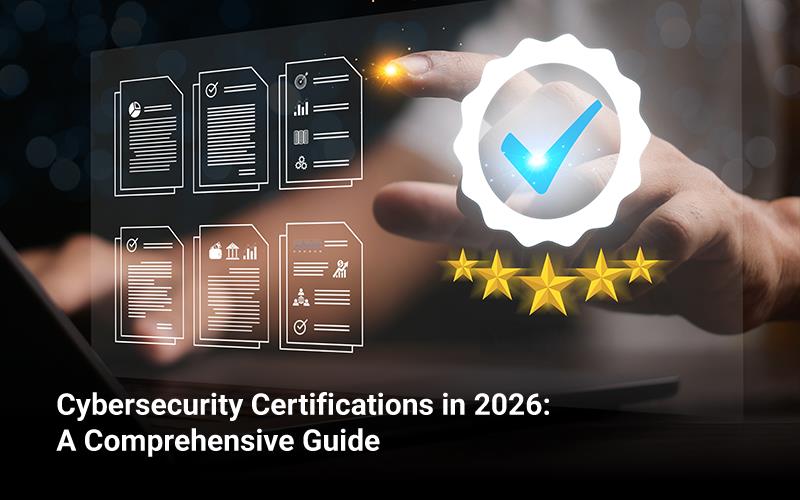A Chief Information Security Officer (CISO) is a senior-level executive responsible for protecting an organization’s computer networks, assets, and systems. They establish frameworks to protect their organization’s data and networks from unauthorized access or theft and ensure its systems function correctly.
The demand for CISOs continues to grow with the progressive increase in cyberattacks. Organizations of all sizes and sectors are keenly aware of the urgent need to protect their digital assets. Organizations must increase their investment in developing talent in this area to develop a successful cybersecurity strategy (Harvard Business Review Analytic Services ). To become a CISO, you’ll need a blend of technical skills, business acumen, and leadership qualities.
This guide outlines the steps necessary to become a CISO, their role and responsibilities, required skills, education, and training. You’ll also learn about relevant experience, pertinent certifications, and CISO’s salary range.
What Is a Chief Information Security Officer?
A chief information security officer is a senior-level executive officer responsible for an organization’s overall information security strategy. A CISO reports to the chief executive officer (CEO) or the chief operating officer (COO).
Steps to Become a CISO
To succeed in this exciting and challenging role, you’ll need to do the following:
1. Get an Education
To become a CISO, you first need to get your bachelor’s degree in cybersecurity, information technology, or a related discipline (Simmons & Widmayer, 2022). A bachelor’s degree will give you the technical foundation to protect an organization’s computer networks, assets, and systems.
You should then consider pursuing a cybersecurity master’s degree if you want to move into a senior-level leadership position like the CISO. Some CISOs have a master’s degree in business administration (MBA) or a master’s of cybersecurity.
2. Gain Relevant Experience
After completing your education, you’ll need to gain experience in the field of information security. You can pursue internships during or after your bachelor’s degree, preferably in a security management role in an IT department.
Many CISOs start their careers in entry-level positions, such as information security analysts or consultants. Some CISOs even have backgrounds in law enforcement or the military and successfully transfer those skills into the CISO role.
Regardless of which path you choose, job experience goes hand in hand with CISO qualifications. Currently, most CISOs have at least ten years of experience in the information security field.
3. Develop Skills and Certification
Once you’ve established yourself in the cybersecurity field, you’ll need to continue developing your skills and knowledge. Many professional fields encourage continuing education, whether formal or informal, but doing so is especially important when it comes to cybersecurity—malicious actors are constantly learning new techniques, and cybersecurity professionals must adapt accordingly.
You can continue your skills development by taking advantage of online resources, attending training courses, and reading industry-related publications. You might also consider pursuing certifications, which are a flexible way to show employers that you’re serious about learning all you can in your field.
Several IT certifications are helpful for CISOs. These include the Certified Ethical Hacker (C|EH), Certified Incident Handler (C|IH), Certified Network Defender (C|ND), and Certified Information Systems Auditor (C|ISA) as well as the Certified Chief Information Security Officer (C|CISO) program.
4. Participate in the Information Security Community
The fourth step to become a chief information security officer is to get involved in the information security community. As a CISO, you must keep up to date with the latest information security technologies. Joining professional organizations, attending conferences, and networking with other CISOs are some of the best ways to stay current with industry trends.
Keeping current will not only help you stay ahead of the curve but will also make you more valuable to your organization. You’ll also be able to share best practices with your peers. By getting involved, you’ll build connections and help foster a stronger cybersecurity community—something that’s especially important in a rapidly growing field like this one.
5. Oversee a Security Team
Lastly, you will need to have experience in overseeing a security team. This team will be responsible for implementing and maintaining the security policies and procedures you have outlined. They will also be responsible for monitoring the network for any suspicious activity and responding to any incidents in real-time. You will need to provide guidance and direction to the team.
CISO’s Skills and Experience
The following skills are necessary to become a CISO:
- Deep understanding of computer systems and networks
- Ability to identify and mitigate risks
- Effective communication with stakeholders
- Data protection policy-writing experience
- Significant corporate leadership experience
- Extensive cybersecurity knowledge
- Familiarity with data security laws and regulations
What is a CISO? CISO Job Description & Responsibilities
CISOs develop and implement information security strategies that protect an organization’s data from attackers. They work with other executive staff to identify and assess risks, develop mitigation plans, and implement security controls. They also work with IT teams to ensure that systems are correctly configured and monitored.
Additionally, CISOs are responsible for incident response planning and execution. They work with law enforcement and other agencies to investigate attacks and prosecute perpetrators. If you want to become a CISO, you should be ready to perform these tasks.
A CISO’s job description includes the following:
- Develop and expand organization-wide security tools and automation.
- Create a security program roadmap aligning with company growth.
- Coordinate security assessment and testing, including penetration testing, threat detection, and secure software engineering.
- Develop mitigation plans and implement security controls in real time.
- Identify security concerns and threats to establish processes and procedures to protect against them.
- Provide strategic IT risk guidance and consultation.
Job Outlook for CISOs
The job outlook for CISOs is promising. The Bureau of Labor Statistics projects that the employment of computer and information systems managers, which includes CISOs, will grow by 11 percent from 2020 to 2030, higher than the average for all occupations.
Companies increasingly rely on information technology to conduct business and store data, and they need CISOs to protect their systems from cyberattacks. Business executives are reevaluating CISO’s position in light of a more stringent obligation to modernize their organizations to combat the cyberattack epidemics (Gaillard, 2022), which means this role may grow even faster than we realize.
Conclusion
The CISO’s role is essential for developing and maintaining an organization’s information security. You must be able to create and enforce security policies, procedures, and controls while also teaching other members of the security team too. Ultimately, the CISO is a senior management role, which means that, while rewarding, it comes with more responsibilities than any other position in information security.
The CISO’s role is vital for developing and maintaining an organization’s information security. If you’re interested in taking the next steps on your CISO path, EC-Council University (ECCU) offers courses in cybersecurity and industry-related certifications that equip graduates to face the latest IT security risks and lead their organizations strategically in handling these challenges.
References
Gaillard, J. (2022, March 10). It’s time to look at the role of the CISO differently. https://www.forbes.com/sites/forbesbusinesscouncil/2022/03/10/its-time-to-look-at-the-role-of-the-ciso-differently/
Harvard Business Review Analytic Services. (2019). Evolving the CISO role to make cybersecurity a competitive advantage. https://hbr.org/resources/pdfs/comm/pwc/Evolvingtheciso.pdf
CyberDegrees.org. (2022, June 27). How to Become a Chief Information Security Officer. https://www.cyberdegrees.org/jobs/chief-information-security-officer-ciso/
About the Author
Shelby Vankirk is a freelance technical writer and content consultant with over seven years of experience in the publishing industry, Specializing in blogging, SEO copywriting, technical writing, and proofreading.
FAQs:
To become a CISO, you must consider taking the following steps:
- Gain education and experience in cybersecurity, information technology, or a related field.
- Earn relevant certifications such as CISSP, CISM, or CEH.
- Build a strong network of professional relationships within the cybersecurity community.
- Develop strong leadership, communication, and management skills.
- Keep up-to-date with the latest trends and developments in the cybersecurity industry.
- Seek out opportunities for professional development, such as attending conferences or pursuing advanced degrees.
-
Consider gaining experience in areas such as risk management, compliance, and governance.
By following these tips and continuously developing your skills and expertise, you can increase your chances of success in the CISO career path.
While having a technical background can be helpful for a CISO, it is not always a requirement. The role of a CISO is primarily focused on managing cybersecurity risks within an organization, which involves developing and implementing strategies, policies, and procedures to protect against cyber threats.
CISOs need to have a solid understanding of technology and cybersecurity concepts to manage their teams and communicate with other stakeholders effectively, but they do not necessarily need to be hands-on technical experts.
Instead, CISOs should have strong leadership, communication, and management skills to effectively coordinate with IT professionals and business leaders and align cybersecurity strategies with business goals. They should also have a good understanding of risk management, compliance, and governance to ensure that the organization’s cybersecurity efforts are aligned with regulatory requirements and industry best practices.







